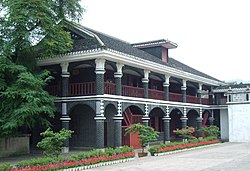This article includes a list of references, related reading, or external links, but its sources remain unclear because it lacks inline citations .(February 2024) |
You can help expand this article with text translated from the corresponding article in Chinese. (July 2021)Click [show] for important translation instructions.
|
- ↑ Sun, Shuyun (2008). "Starting Afresh". The Long March. ISBN 978-0-307-48765-0.
External links
- F. S. Litten: The Myth of the 'Turning-Point' - Towards a New Understanding of the Long March (article in 'Bochumer Jahrbuch zur Ostasienforschung', 2001)
| Zunyi Conference | |
|---|---|
 Site of the meeting in Zunyi |
National meetings of the Chinese Communist Party | ||||||||
|---|---|---|---|---|---|---|---|---|
| National Congress |
| |||||||
| Delegates Assembly | ||||||||
| Notable Politburo & Central Committee plenums |
| |||||||
| Recurring | ||||||||
